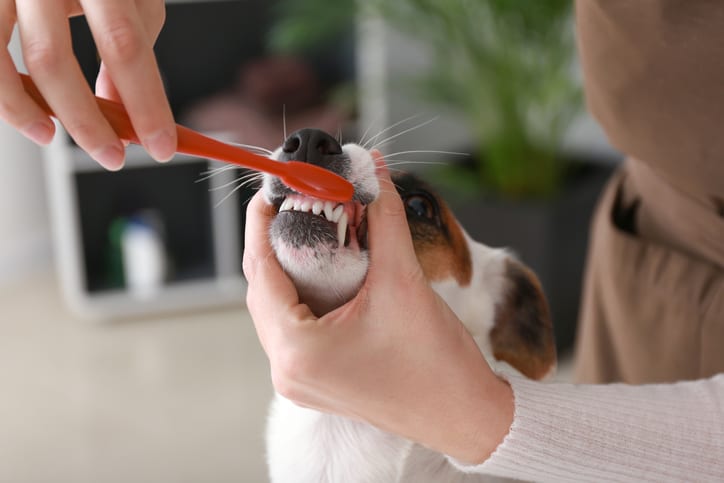Dog Teeth Cleaning in Stevenson Ranch, CA: What You Should Know

If you have a dog, you probably already know that his breath can become unpleasant pretty often. But did you know there are plenty of other reasons why you should consider having his teeth cleaned? Dog teeth cleaning can help with a variety of potential issues, but many dog owners have questions about this procedure.
In this article, we’ll walk you through the basics you need to know about having your dog’s teeth cleaned. With this information, you should be able to answer many of the questions you have about it before moving forward.
Benefits of Dog Teeth Cleaning
Prevents Dental Disease
Just like humans, dogs can prevent the risk of dental disease by having regular teeth cleanings. This can also cut down on the risk of gum disease as well as infections that could spread to the jaw.
Prevents Tooth Decay
Of course, having your dog’s teeth cleaned often can cut down on the risk of tooth decay as well. When your dog’s teeth are kept clean, they won’t hold as many bacteria that could potentially wear away the enamel and lead to the decay of the teeth. This, in turn, prevents your dog from having pain when he eats or chews on his favorite toys.
Prevents Bad Breath
Dogs usually have somewhat bad breath, at least by human standards, but exceptionally bad breath is a sign your dog may need to have his teeth cleaned. When you keep up with frequent and regular teeth cleanings for your dog, you can help his breath stay fresher for longer.
Prevents Heart Disease
Plaque buildup on teeth is a leading contributor to heart disease in dogs. If your dog is still young, you can prevent or significantly reduce the risk of heart disease by ensuring his teeth are kept as clean as possible. Older dogs may benefit, too, but your veterinarian can give you more information.
Dog Teeth Cleaning Process
First, vets will perform lab work to determine whether or not it is safe for your dog to undergo anesthesia. This is crucial, since it can tell the vet what underlying conditions, if any, your dog may be dealing with. The vet can then use this information to decide whether or not to proceed.
Next, your dog will be given an injection to relax him before the cleaning starts. This shot is not the anesthesia that will help him stay asleep during the procedure, but it can make the experience overall easier for him by calming him down beforehand.
Your dog will also be given IV fluids throughout the procedure. These may be placed before the anesthesia if your dog is calm enough, but they can be placed after anesthesia if your dog is too unsettled beforehand. The vet will make a decision after seeing how your dog reacts to the first injection.
The vet will give your dog an anesthetic and place a breathing tube after he has gone to sleep. The anesthetic will keep your dog asleep, and the breathing tube will ensure he gets enough oxygen and prevents liquid from entering his lungs during the cleaning, too.
Throughout the teeth cleaning, the vet will work on cleaning your dog’s teeth while techs will monitor his vitals and his anesthesia. Techs will keep a close watch on how well your dog is doing physically while he is undergoing the procedure. At the same time, they will watch for signs that the anesthesia could be wearing off, and they will administer more if necessary to keep him asleep so he feels no pain while the work is being done.
What are the Risks?
Complications with Underlying Conditions
Dogs who have underlying health problems are always at risk when they are put under anesthesia. The severity and type of your dog’s health problem will help your vet figure out whether or not to go forward with the cleaning. In some cases, the risk could be outweighed by the benefits, but the choice will be yours to make.
Complications with Older Dogs
Older dogs also have some risks associated with anesthesia. Once again, your vet will need to consider your specific dog’s situation and help you choose between having the cleaning or accepting the risks of uncleaned teeth instead.
Armed with this information, you can choose whether or not it is a good idea to have your dog’s teeth cleaned. Keep in mind that, as long as your dog is a good candidate for a cleaning, you should have this done by a vet at least every couple of years, or more often if possible.
Call Your Vet About Dog Teeth Cleaning in Stevenson Ranch
Your vet can give you more specific information about your own individual dog’s needs, call Stevenson Ranch Veterinary Center at (661) 799-0655. Working with your vet, you can also determine if there are any risks you should consider before scheduling a cleaning, too.
Check Your Pet's Records
Look no further, PetDesk allows you to view your Pet's Health information, appointment reminders, etc.
Let's Go Shopping
Need a refill on vitamins, food, etc for your pet? Check our our online store.
Book an Appointment
Looking for Veterinary Care? Stevenson Ranch is a place that you can your pet can depend on for exceptional care.
